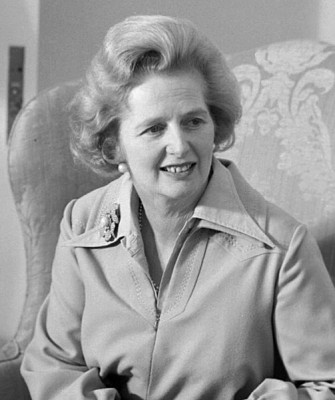The characteristic features of Margaret Thatcher as a human and things that are the fundament of Thatcherism are: seriousness, persistence and fight. In the world in which a word does not mean anything and can be freely interpreted, she seemed to be a person from a different world.
In October 2009, one of the magazines in Łódź had a cover with Margaret Thatcher. The reason for such a choice of a cover was the fact that soon she was going to be granted the Honorary Doctorate of the University of Łódź. Surely, there would be no reasons for memories if it had not been for the fact that Thatcher was depicted in the style of Andy Warhol’s cult paintings. Both his paintings and Margaret Thatcher became icons.
Surely, for the next days the media will write both negatively and positively about the achievements of the British Prime Minister. The issues of milk for schools, fights with trade unions and IRA, the Falklands War, privatisation etc. will come back. It is good because young generation should be reminded of who she was and what she did. It has been more than twenty years since she resigned from prime minister’s post, but still – together with Ronald Reagan – she is a political synonym of the ’80s. But who remembers Francois Mitterrand or Helmut Kohl although the first one served for fourteen years and the latter for sixteen years? No “Mitterandism” or ” Kohlism” came into being. But Thatcherism exists as an idea to which people from such environments as “Najwyższy czas” or “LIBERTÉ!” refer to in Poland. What is so attractive about her? Economic liberalism? Social conservatism?
Earlier and later on many politicians voiced such slogans, but they did not manage to become icons or role models. The characteristic features of Thatcher as a human and the things that are the fundament of Thatcherism are: seriousness, persistence and fight.
Seriousness – because Margaret Thatcher treated her views and people to which she used to voice them seriously. She was one of few politicians whom you could believe and trust that deeds would follow declarations, that she would do her best to put promises into effect. She bore huge costs. In the world in which a word does not mean anything and can be freely interpreted, she seemed to be a person from a different world. She did not understand connections, historical, party and social necessity etc. That is what distinguishes her in the international arena and when we compare present-day politicians and her contemporaries to her – they look like boys in “shorts”.
Persistence – it is a slightly forgotten and discarded feature by people who perceive ice cubes as icebergs. Without persistence, the value of all declarations would not have any sense. The status quo, the nightmare of every reform can be fought only by persistence, that is the faith that you do the right thing and do not turn back from the once chosen way. Then cutting remarks, mocking articles, rankness of unionists, colleagues’ plots and pressures from the outside do not matter.
Fight – probably the most important feature of Thatcherism, because she had to fight all the time. She had to fight for the access to the male world of politicians, for her position in the party and parliament, for her place in the first bench, for minister’s post, for the Tories’ reforms, for leadership in the party, for releasing the United Kingdom from socialists’ hands, for the approval of the programme, for Falkland Islands and finally for the privatisation of state-owned big enterprises. This fight, which was usually won, brought results. After some years of her governance the country changed. She turned an “ill human of Europe” into a leading capitalist economy. She proved that it is possible to overcome socialist aberrations and that there exists a cure for this hellish illness.
Very often it is said that she was the most eminent prime minister of the United Kingdom since World War II, meaning since the times of Winston Churchill. But how can one compare a person who (after losing her power) left Europe, her country, her party and her opposition radically different than it had been before her taking power, with a person who not only led to the collapse of the empire but also gave half of Europe into communists’ hands. No, this is not true. Margaret Thatcher was the most eminent British politician in the 20th century.
On the day of Margaret Thatcher’s death my friend called me and said: “The Queen died but we cannot say >>Long live the King!<<”. That is true, a new King or Queen cannot be seen on the horizon of the United Kingdom, Europe or Poland.
Translation: Anita Stradomska



